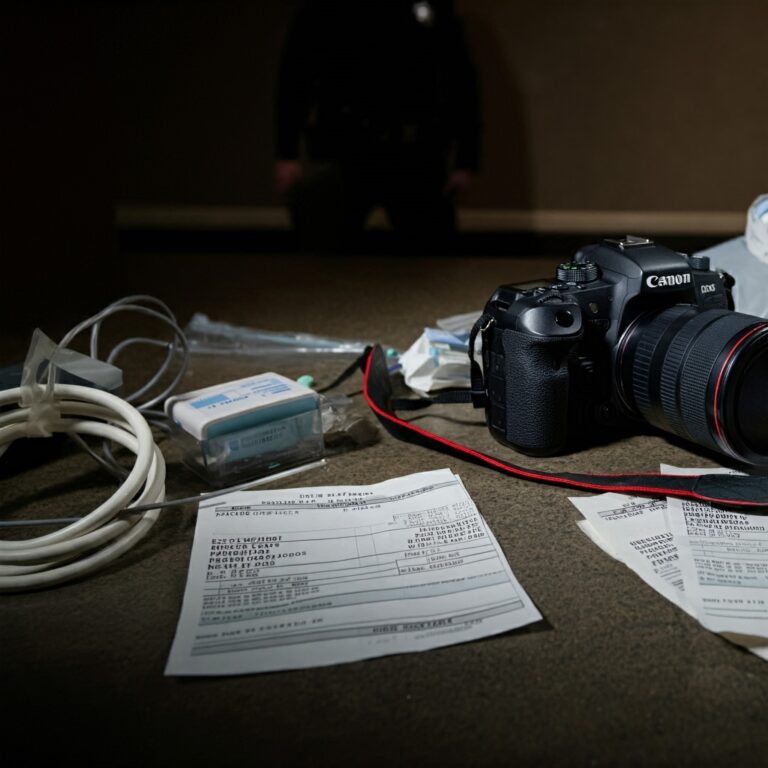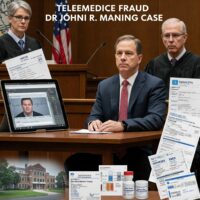Jacksonville, FL – A complex web of deceit involving telemarketers, rogue doctors, and unscrupulous pharmacy owners has unraveled in a Florida courtroom, resulting in federal prison sentences for four men who orchestrated a staggering $54.3 million Medicare fraud scheme. U.S. District Judge Timothy J. Corrigan delivered the sentences, which include prison time, hefty fines, and orders to repay millions to the defrauded Medicare program.
Luis Lacerda, Omar Solari, Michael Murphy, and Joelson Viveros each pleaded guilty to conspiracy charges for their roles in the elaborate scheme that preyed upon unsuspecting Medicare beneficiaries and exploited the telemedicine system.
Anatomy of the Scam:
The fraudsters employed a multi-layered approach to bilk Medicare:
- Aggressive Telemarketing: Companies from Jacksonville, FL, contracted by the conspirators, unleashed aggressive telemarketing campaigns. They targeted vulnerable elderly and disabled beneficiaries, often using misleading language and false promises of “free” pain relief creams and other medications. Unsuspecting beneficiaries, lured by these offers, divulged their Medicare information, unwittingly becoming pawns in the scheme.
- Complicit Physicians: The conspirators established connections with telemedicine companies that employed or contracted with physicians willing to participate in the fraud. These doctors, often located in different states, had no prior relationship with the beneficiaries and conducted only cursory telephone conversations, if any, before signing prescriptions for medications the beneficiaries didn’t need. Dr. [Doctor’s Name], who worked with [Telemedicine Company], admitted in court to signing hundreds of prescriptions without ever examining or even speaking to patients, relying solely on fabricated medical histories provided by the conspirators.
- Prescription for Profit: The fraudulent prescriptions primarily focused on expensive topical creams, such as [insert examples of cream names, if known]. While these creams might have legitimate uses in certain cases, they were prescribed indiscriminately, regardless of medical necessity. This tactic allowed the conspirators to maximize their profits by billing Medicare for high-priced medications.
- “Recycling” Beneficiaries: To further amplify their illicit gains, the conspirators engaged in a practice known as “recycling.” They submitted claims for the same beneficiaries through multiple pharmacies they owned and controlled, sometimes altering patient information or forging prescriptions to avoid detection. This allowed them to repeatedly bill Medicare for the same unnecessary medications, generating millions in fraudulent reimbursements.
Unmasking the Fraud:
The elaborate scheme eventually unraveled under the scrutiny of a joint investigation by the U.S. Department of Health and Human Services – Office of Inspector General (HHS-OIG) and the Federal Bureau of Investigation (FBI). Investigators utilized a combination of data analysis, whistleblower accounts, and potentially undercover operations to piece together the complex web of deceit.
Assistant U.S. Attorney David B. Mesrobian and Trial Attorney Gary Winters of the Department of Justice – Criminal Division, Fraud Section, presented a compelling case, highlighting the defendants’ deliberate efforts to defraud Medicare and exploit vulnerable beneficiaries. The evidence, including financial records, telemarketing scripts, and physician testimonies, proved overwhelming, leading to guilty pleas from all four defendants.
Justice Delivered:
Judge Corrigan handed down the following sentences:
- Luis Lacerda: 3 years and 5 months in federal prison; $15,600,333.30 in forfeiture; $54,303,526 in restitution.
- Omar Solari: 2 years and 6 months in federal prison; $6,341,240.58 in forfeiture; $36,246,251 in restitution.
- Michael Murphy: 15 months in federal prison; $3,650,943.36 in forfeiture; $8,374,175 in restitution.
- Joelson Viveros: 5 years’ probation; $894,116.45 in forfeiture; $3,017,135 in restitution.
The varying sentences reflect the different roles and levels of involvement of each defendant in the scheme. Judge Corrigan considered aggravating factors, such as the scale of the fraud and the exploitation of vulnerable individuals, as well as mitigating factors, such as cooperation with the investigation and expressions of remorse.
Impact and Prevention:
This case underscores the growing threat of telemedicine fraud and the need for increased vigilance. While telemedicine offers valuable healthcare access, it also presents opportunities for exploitation by unscrupulous individuals.
“This scheme not only defrauded Medicare of millions of dollars but also potentially harmed beneficiaries who received unnecessary medications,” stated [insert quote from law enforcement official or prosecutor, if available]. “The Department of Justice is committed to pursuing those who engage in healthcare fraud and abuse, particularly those who prey on vulnerable populations.”
To combat telemedicine fraud, authorities are implementing stricter regulations and oversight. These measures include increased scrutiny of telemedicine companies and physicians, enhanced beneficiary education, and advanced data analytics to identify suspicious billing patterns.
This case serves as a stark reminder of the importance of safeguarding the integrity of healthcare programs and protecting patients from those who seek to profit from deception.














